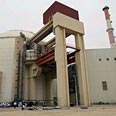
Iranian nuclear plant in Bushehr
צילום: איי פי
The president's test
President Bush must act on pledge to safeguard Israel vis-à-vis Iran threat
If the National Intelligence Estimate (NIE) is right and the Iranians are indeed motivated by cost-benefit calculations, then it is now more important than ever to increase pressures on Iran
In January, George Bush will visit Israel for the first time as President, with just a year of his term ahead of him. Bush cannot afford to be a "lame duck" president, for 2008 is a year of historic trials for him, and it is not like him to yield in the face of challenges. Riding on the successes of the surge in Iraq and the donors' conference on Palestinian aid, the president, considered a friend of Israel, may now be able to garner influence regarding issues more vital to Israeli strategic interests. At the heart of these lies the looming threat of a nuclearizing Iran.
However, in the wake of the recently published summary of the National Intelligence Estimate (NIE), which has already received much criticism, including from senior and authoritative Americans such as former Secretary of State Henry Kissinger and former Secretary of Defense (and CIA Director) James Schlesinger, the feeling has spread in the United States and Europe that the US or allied military option against Iran has become irrelevant. So much so, that a senior European official recently inquired if, now that Israel has been left to its own devices to face a threat it perceives as being existential, it will engage in military action against Iran - and if so, which of its capabilities it will use.
A different interpretation of the intelligence report was provided by retired Russian General Vladimir Dvorkin during the "Luxembourg Forum," which brings together nuclear strategists from various countries. Dvorkin perceived the thrust of the report as being disquieting rather than reassuring. In his opinion, the central finding of the report was the very fact that until 2003, Iran had a nuclear weapons program. This is a much more damning finding than the exposure that same year of the uranium centrifuge enrichment facility at Natanz.
Dvorkin does not see the fact that Iran's military program was allegedly suspended as an encouraging bit of news; on the contrary, it could point to the fact that Iran's mission has been accomplished, particularly if that mission was to build simple "gun-type" mechanisms. In Dvorkin's opinion, the program was frozen in order to allow for the production of the larger amounts of fissile material that such mechanisms require. But time has passed since 2003, and Iran has since developed its missile delivery capabilities. Now all that remains for it to complete an operational nuclear weapons arsenal is to produce the necessary amounts of fissile material.
Tougher sanctions more urgent than ever
At the "Luxembourg Forum," a call for a conciliatory approach towards Iran was led by former Director General of the IAEA, Hans Blix. He suggested that the West reduce sanctions and increase incentives to reach a last-minute grand bargain with Iran, the main incentive being a no-attack assurance. But Blix couldn't have failed to notice that with the credibility of the military option now undercut by the NIE, its bargaining advantages vis-à-vis the Iranians has certainly declined, thereby reducing the chances for a satisfactory grand bargain.
Thus, were the NIE to lead to a decrease in sanctions and the elimination of the military option, Blix's apparently soothing assessment would actually make it easier for Iran to obtain nuclear weapons.
If the observation of the NIE's authors is correct – that Iran is motivated by cost-benefit calculations – then it is now more urgent than ever to intensify the political and economic sanctions against Iran, particularly in the critical area of the importing of oil products and the exporting of oil and gas. Moreover, it is crucial to restore credibility to the military option.
This, in fact, is President Bush's obligation, if he is devoted to his self-proclaimed principles and commitments. In June 2002, in his West Point address, he stated his support for a nation's right to take preemptive military action against a hostile and rogue state on the verge of acquiring nuclear weapons. He later asserted that the United States would not be prepared to accept the possibility that Iran become nuclear, and reaffirmed America's commitment to the security of Israel.
All of these assertions will have to be reaffirmed in 2008. This will be the year in which George Bush's adherence to his policies, beliefs, and commitments will be put to the test. On his upcoming visit, it would be fitting for the President to reiterate the guarantees he gave Israel regarding the Palestinian issue in his 2004 letter to Prime Minister Ariel Sharon. As for his commitment to preventing Iran from acquiring nuclear weapons, this should be given expression not only through words, but by deeds.










